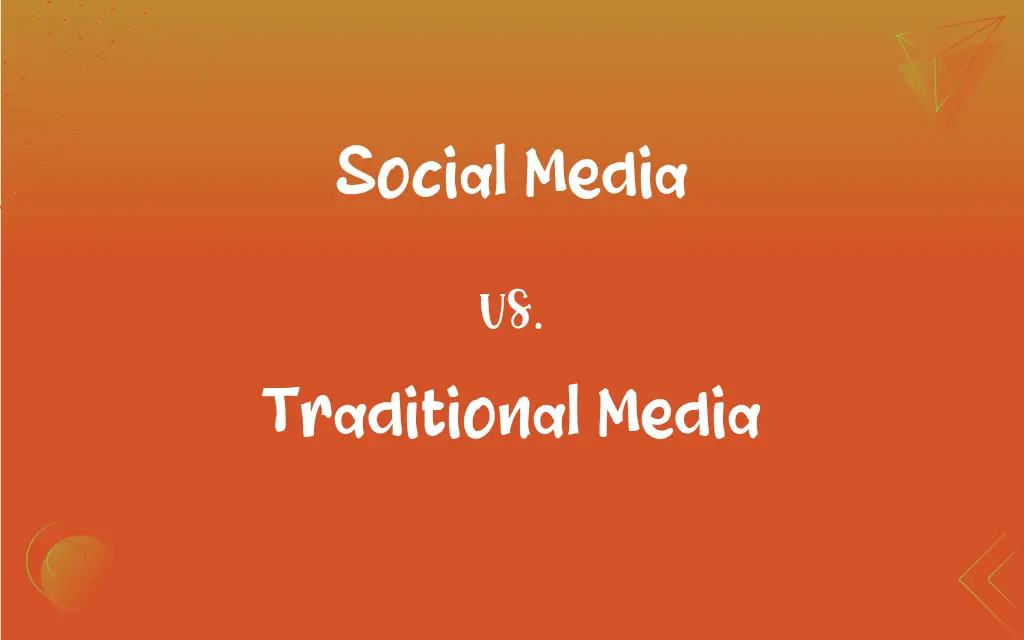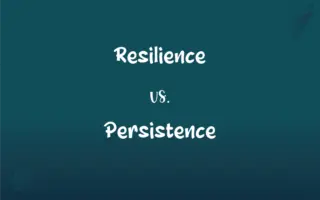Social Media vs. Traditional Media: What's the Difference?
Edited by Aimie Carlson || By Harlon Moss || Published on November 26, 2023
Social media is interactive, web-based platforms enabling user-generated content, while traditional media includes established forms like TV, radio, and newspapers.

Key Differences
Social media allows user interaction and content creation, such as posting on Facebook. While, traditional media, like television, offers content in a one-way format without direct audience interaction.
Traditional media often requires substantial resources and professional production, as seen in newspaper journalism. However, social media platforms enable anyone with internet access to create and share content.
The reach of social media is global and instantaneous, evident in viral tweets. Traditional media, such as radio broadcasts, has a more localized and time-bound reach.
In social media, feedback is immediate and visible, like comments on Instagram posts. Meanwhile, traditional media feedback, such as letters to a newspaper editor, takes longer and is less visible.
Social media trends and popularity can change rapidly, influenced by user engagement. Traditional media, like published books, often has more enduring content.
ADVERTISEMENT
Comparison Chart
Interaction
Highly interactive
Limited interaction
Content Creation
User-generated
Professionally produced
Reach
Global and immediate
Localized and time-bound
Feedback
Immediate and public
Slower and less visible
Trends
Rapidly changing
More stable and enduring
ADVERTISEMENT
Social Media and Traditional Media Definitions
Social Media
Digital channels for interactive communication.
She uses social media for customer engagement.
Traditional Media
Non-digital forms of mass communication.
Newspapers are a key part of traditional media.
Social Media
Web-based communities for social interaction.
Social media has revolutionized how we connect.
Traditional Media
Long-standing methods of information dissemination.
Traditional media often offers in-depth journalism.
Social Media
Websites where users create and share content.
His blog post on social media went viral.
Traditional Media
Established broadcasting and publishing mediums.
The evening news on traditional media covered the event.
Social Media
Platforms for personal and professional networking.
He landed a job through a social media connection.
Traditional Media
Conventional channels like TV and radio.
Traditional media advertising reaches a different audience.
Social Media
Online platforms for sharing and networking.
She found her old classmates through social media.
Traditional Media
Media not involving online or digital platforms.
She prefers the feel of a book from traditional media.
FAQs
What is social media primarily used for?
For networking, content sharing, and user interaction.
Can social media influence public opinion?
Yes, it's a powerful tool for shaping views and trends.
Can traditional media offer real-time updates?
Not as readily as social media, which excels in immediacy.
Do traditional media outlets use social media?
Yes, many have social media profiles to extend their reach.
How does traditional media disseminate information?
Through one-way channels like newspapers, TV, and radio.
Are traditional media sources more reliable?
They often have rigorous editorial standards and fact-checking.
Do traditional media channels allow audience interaction?
Limited, mainly through letters to the editor or call-ins.
How do social media platforms generate revenue?
Mainly through advertising and data analytics.
How has social media affected news consumption?
It has made news more accessible and immediate.
Is user privacy a concern with social media?
Yes, data privacy is a major issue in the digital age.
Is social media accessible to everyone?
Mostly, but it requires internet access and digital literacy.
Has social media impacted traditional advertising?
Yes, it has introduced new, targeted advertising methods.
Does social media offer diverse viewpoints?
It can, but echo chambers and algorithms may limit this.
Is fact-checking easier on social media or traditional media?
Traditional media typically has more robust fact-checking.
Are podcasts considered social media or traditional media?
They are a hybrid, using digital platforms but often mirroring traditional formats.
Is traditional media considered more formal?
Generally, it maintains a more formal tone and presentation.
Can traditional media provide personalized content?
Not as effectively as social media's algorithm-driven content.
Are traditional media sources adapting to digital trends?
Many are expanding their digital presence to stay relevant.
How quickly can news spread on social media?
It can spread globally within minutes or seconds.
Can social media be a source for investigative journalism?
Yes, but it's more commonly associated with traditional media.
About Author
Written by
Harlon MossHarlon is a seasoned quality moderator and accomplished content writer for Difference Wiki. An alumnus of the prestigious University of California, he earned his degree in Computer Science. Leveraging his academic background, Harlon brings a meticulous and informed perspective to his work, ensuring content accuracy and excellence.
Edited by
Aimie CarlsonAimie Carlson, holding a master's degree in English literature, is a fervent English language enthusiast. She lends her writing talents to Difference Wiki, a prominent website that specializes in comparisons, offering readers insightful analyses that both captivate and inform.






































































